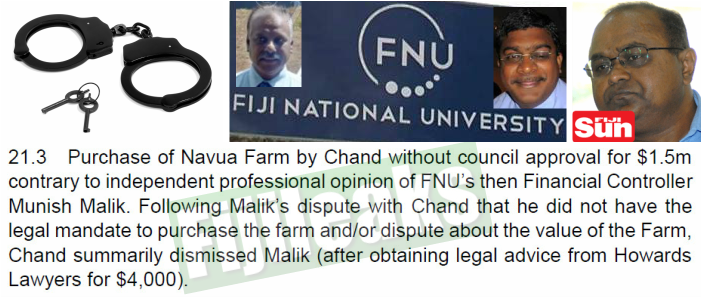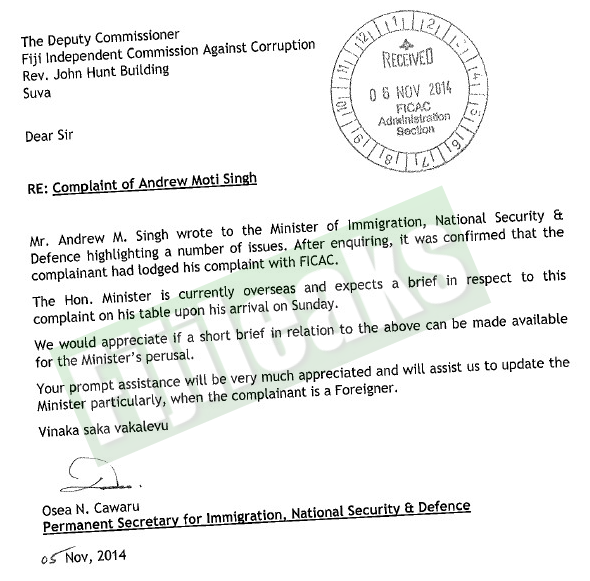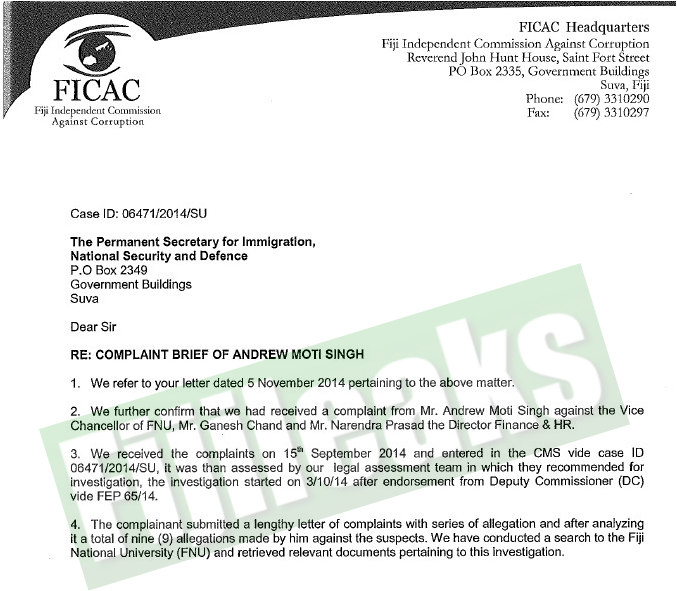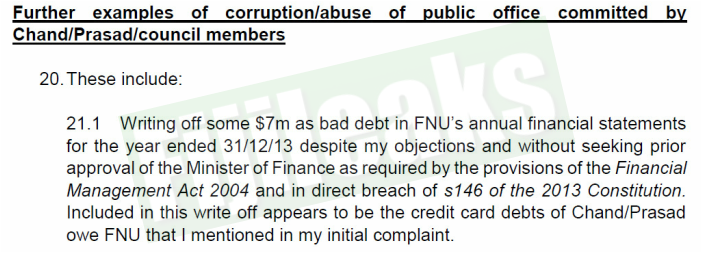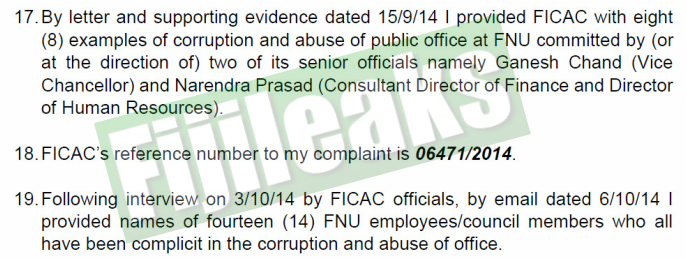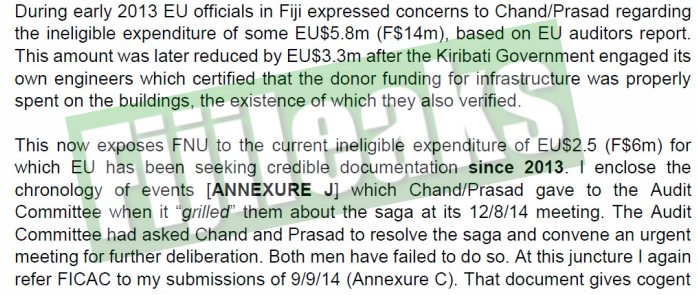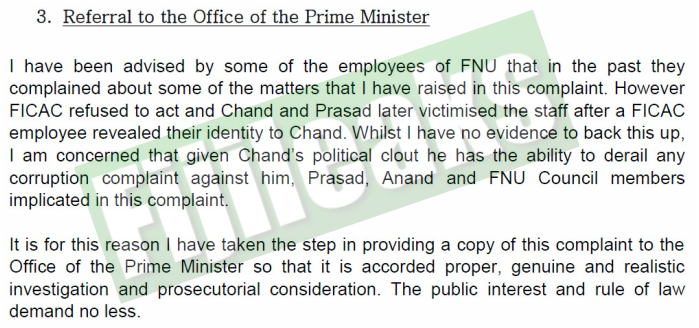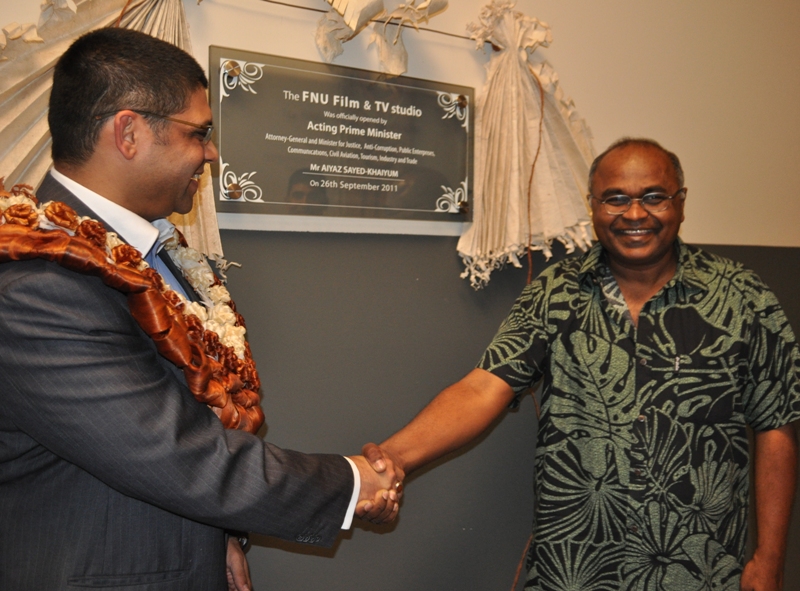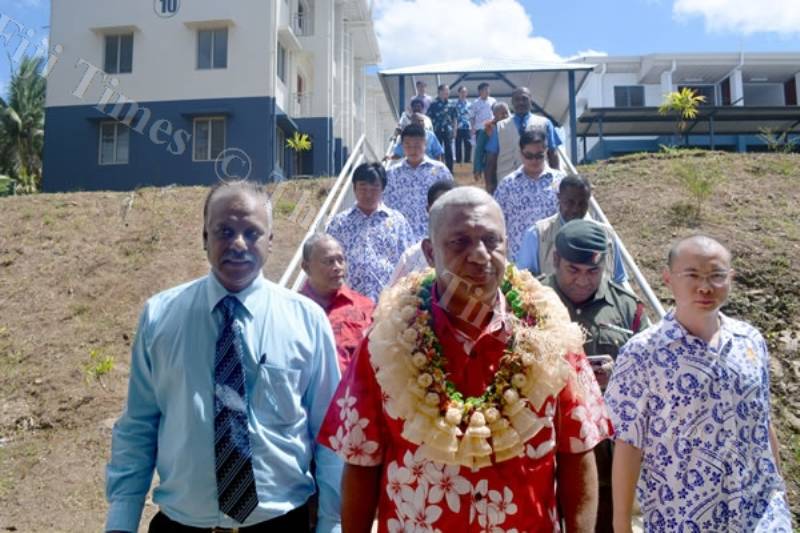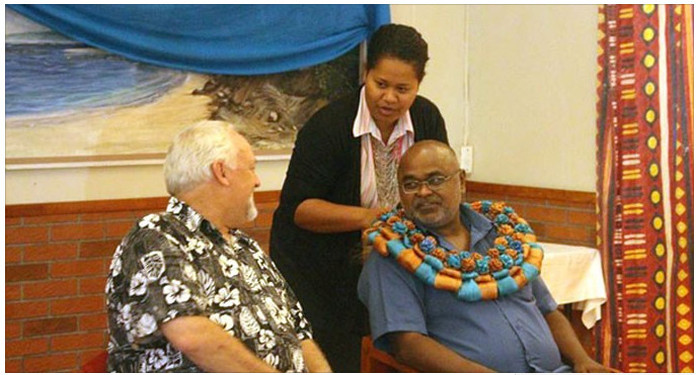Fijileaks Editor: A VICTOR LAL exclusive beginning TOMORROW on the raft of complaints against "Dada" Chand and his obliging side-kicks at FNU as contained in the letter and supporting evidence given to FICAC! We will reveal how Ganesh Chand and his side-kick Narendra Prasad, with Mahendra Reddy and other FNU Council members turning a blind eye, ran FNU as if it was Chand's "ANIMAL FARM"; now they have let him escape with FICAC dithering to take him and many others into CUSTODY!
Fijileaks Editor: We publish below Wadan Narsey's praise and defence; he says where is natural justice for Chand - what the championing professor failed to read between the lines is that the FNU Council dumped "a bad penny" to save their own "pound" of flesh from FICAC!
"It is surely also no fault of VC Ganesh Chand that since the 2006 coup (i.e. right from the inception of FNU) the traditional donors (Australia, NZ, EU and others) shunned providing funds to a national institution like FNU because of their sanctions against the Bainimarama Government, with USP thereby enjoying the real “windfall gains” (through no sweat on their part), because donors wished to stay engaged with the Fiji people, even if indirectly. Now that Fiji has a democratically elected government and donors have re-established normal relations with Fiji, I expect donor funds to flood to FNU over the next four years (I sincerely hope that the exhilarated new FNU executives do not proudly claim personal credit for this turnaround).Wadan Narsey
 Narsey
Narsey Professor Wadan Narsey (10 January 2015)
The sudden departure of the founding Vice Chancellor from the Fiji National University (FNU) is an important enough event for the real owners and stakeholders in the university- the tax payers of Fiji, the current and future students and their parents, and future employers of the graduates, to call for honest answers from the Bainimarama Government.
Professional, transparent and accountable human resource management, is a crucial part of the good governance of all corporate bodies, including universities and their councils, and companies with their boards of directors.
Between 2006 and 2014, the unelected Bainimarama Government hired and fired civil servants, board members and senior management of statutory authorities, as they wished, with little transparency or accountability to the public.
The Public Service Commissioners and boards of the statutory authorities were merely “rubber stamps” uncritically obeying ministers’ orders and sending out the letters of dismissal, with the victims having no recourse to appeal, either within the organization or the courts.
With an elected government in place today, the public rightly expect that ministers will be fully transparent and accountable to the tax payers, whose assets and development interests are at stake.
But the well-publicized allegedly “amicable” departure of the Vice Chancellor of FNU (this article) and the termination of two senior executives from Fiji TV (another article) indicate that good governance is being seriously undermined by ministerial interference and undesirable micro-management of our public bodies.
Unless other facts are revealed to the public, the evidence here indicates that members of the FNU Council, and specifically its Chair (Minister of Education, Dr Mahendra Reddy), are seriously failing in their fiduciary duty to the Fiji taxpayers, by pressuring the FNU Vice Chancellor into a supposedly “amicable” departure, thereby undermining the independence and academic integrity of Fiji’s national university, and denying natural justice to its CEO.
Similar events have also taken place with respect to the termination of the Fiji TV executives.
For Fiji to return to being a just society, the public must show the courage to shake themselves out of their current cowardly lethargy and demand full accountability, transparency and integrity from the FNU Council and Fiji TV Board members, who have a fiduciary duty to professionally and fairly manage the human resources they have accepted responsibility for.
The public must also demand accountability from the Bainimarama Government which promised honest and transparent governance to voters, not just during the September 2014 elections, but in the values espoused by their own 2013 Constitution.
The Departure of FNU Vice Chancellor
The Press Release signed by the Minister of Education (dated 29 Dec. 2014) ) stated:
“Following discussion’s in the Council meeting for a redirection and consolidation of the University’s strategic focus, the Chairperson of the University Council, the University Council and the Vice Chancellor have mutually agreed that the Vice Chancellor’s employment contract be brought to an end before the expiry of the same. The mutual parting of ways has been amicable.”
The Minister also stated paradoxically:
“The University Council is full of praise for Dr. Ganesh Chand. Having worked with the Vice Chancellor over the past 5 years, and having seen his leadership first hand, I echo these sentiments as well. Dr. Chand was always on his toes. He was full of energy and determination to make the University a credible and a leading university. It was his strategic thinking, and his drive, enthusiasm and passion that saw the rapid development of the University.”
Dr Reddy forgot to mention that it was the vision, energy and enthusiasm of Dr Ganesh Chand that saw the formation of FNU from its disparate elements in the first place.
In the process he would have had to tread on the toes of many former CEOs who were suddenly deprived of total control of their turfs, and diplomacy is not known to be one of Dr Ganesh Chand’s strengths. But Dr Chand is also credited by many as being the initiator of Fiji University as well, until micro-managers there ensured a parting of ways.
But while the Press Release gives the impression that the FNU Council also wished Dr Chand to depart, VC Chand’s email to FNU staff (of 30 Dec. 2014) clearly stated otherwise:
“Please be advised that the Chairperson of the FNU Council, Dr. Mahendra Reddy, advised me and the members of the Council of the University of the need to change the Vice Chancellorship of the University”. (my emphasis)
It may be relevant that the FNU Council’s term was finishing at the end of the year and a new one was to be appointed by the Minister for Education.
Dr Ganesh Chand would have naturally expected, given the experiences of many others in similar positions, that the Minister could easily appoint Council Members enough of whom would be amenable enough to eject the VC without fulfilling his contractual entitlements, further reduced by costly legal battles. It was probably quite sensible for Dr Chand to accept his contractual entitlements, and agree to call his departure “amicable”, which he did.
But, given the full-some praise of Chand by both Dr Reddy and the FNU Council, the public are entitled to ask what reasons were given by Dr Reddy to justify terminating Dr Chand’s tenure as Vice Chancellor, before the end of his contract.
While many, for political reasons, may chuckle at Ganesh Chand’s departure from FNU, there are far more important issues critical for FNU’s academic integrity and future independence.
If the Education Minister’s stated “hands-on” approach (i.e. micro-management, including termination of staff considered “undesirable” by Government), is accepted by the FNU Council, there is grave risk to academic freedom at FNU, inevitably leading to “self-censoring” by academic staff for self-preservation, as they currently do at The University of the South Pacific (USP).
So what were the reasons for the Vice Chancellor’s departure, euphemistically described as “amicable”?
Reddy’s reasons for termination
There have been many allegations on the blogs about the reasons for Dr Chand’s departure including unproven allegations of nepotism and fraud being investigated by FICAC, but these were denied by Dr Reddy as a reason for the amicable separation.
Dr Reddy is quoted by The Fiji Times (of 30 December 2014) as saying that he and Dr Chand had a “slight divergence of views” and that “We believe that now is not the time to make any new major expansion but the time to consolidate, and I think that’s where the difference is”.
Dr Reddy also claimed that the FNU Council wanted a “redirection and consolidation of the university’s strategic focus” which was not the same direction Dr Chand was taking the university and “the Council decided mutually with Dr Chand that he will leave FNU“(my emphases).
But the Minister’s claim that Dr Chand had to leave merely because of a “slight divergence” of opinion between himself and the Vice Chancellor over some “focus on consolidation rather than expansion” is totally lacking in credibility and needs further examination, as is his allegation that the FNU Council also disagreed with the Vice Chancellor’s strategic direction and therefore wanted him out.
The ordinary public may not know that Dr Mahendra Reddy, a former colleague and close friend of Dr Ganesh Chand at USP, was in fact hired by the FNU Vice Chancellor to be one of his important Deans, and was subsequently in his innermost circle of decision-making on all strategic developments at FNU.
The Minister was well aware of the VC’s ambitious plans, based on his sound knowledge and experience as a labour market economist of the demand for tertiary technical graduates in Fiji, regionally and internationally, to appropriately plan the further expansion of FNU in both range of activities and geographical catchment outreach, not just to Vanua Levu but also the wider Pacific region.
These were plans that any labour market economist (including myself), the FNU Council, and the Bainimarama Government would have approved, given their strategic political and economic assistance to several PICs, especially the Melanesian and the Micronesian countries, such as in teaching assistance.
If the FNU Council felt differently about some specificities in the FNU plan, all they had to do was to express their wishes to the Vice Chancellor as a policy guideline which he would have had to implement.
Should the Vice Chancellor then fail to follow the accepted policy guidelines, it is basic good practice in human resource management that the FNU Council would officially notify the VC in writing, and give him the opportunity to remedy the alleged defects, with a warning of termination if the VC did not comply satisfactorily.
Is there any record of the FNU Council ever formally expressing its dis-satisfaction with the FNU Vice Chancellor’s performance in any respect whatsoever, including FNU’s future direction?
I doubt it, as I have been told by anonymous sources that Dr Chand was fully supported and praised by the FNU Council, and there was no dissatisfaction with his performance as Vice Chancellor, certainly not serious enough to warrant his termination as Vice Chancellor.
It is also beyond comprehension that an experienced academic and wily administrator like Dr Ganesh Chand, would have refused to accede to any reasonable FNU Council decision for a “change of focus” and “consolidation” rather than “expansion”, especially if termination was given as the alternative.
Dr Reddy’s public explanations for Ganesh Chand’s departure from FNU are internally contradictory, flimsy, and just do not hold any water.
Of greater relevance may be the dressing down he gave the FNU Council and the Vice Chancellor in mid-November.
Dr Reddy’s Address to FNU Council
The Minister’s address to the FNU Council on the 10 November 2014 as Chair of the FNU Council, included the following statements, which I quote verbatim in italics (with grammatical errors, surprising for a Minister of Education who constantly demands quality from schools and teachers):
“Members, our own National University allow government to peddle its national agenda….It can ask, direct or instruct the University to take the programme, discourse, spending in a direction that will allow the University to deliver on to the vision of Government….
the governments vision which could have amendments every now and then are to be presented to the senior management as when the amendments are made. It is for this reason Government is responsible for the appointment of the Council and the Senior Management team…..
it is for this reason, to protect the CEO and Government and provide guidance with the framework of the Decree and other policies of University, we have Council sub committees. These sub committees must scrutinize thoroughly papers and ask critical questions which will ensure that the University remains on course at all times.”
One sentiment expressed here is acceptable: i.e. that once appointed, the FNU Council, with the assistance of its Sub-Committees, is then directly responsible for ensuring that the Vice Chancellor delivers upon the Vision and Mission Statements, and whatever Strategic Plans that have been agreed upon collectively between the Council and Senior Management.
But Dr Reddy’s speech went on to state quite worryingly:
“there is a contrary view that Government appoints the CEO and then sits back and only at quite a late stage to realize that the damage is done. The CEO/VC is accountable to the Government via the Council. A hands off approach could spell disaster and provide room for bad governance practice hands an oversight is needed.” (my emphasis)
So what did Dr Reddy see as the damage, nay, the “disaster” brought on by VC Chand?
Dr Reddy listed them: public relations with stakeholders and potential donors could be improved; there were concerns about the suitability and quality of some existing programs, staffing, library resources and workshops; there was a public perception of FNU associated with FICAC’s raid on FNU; and inadequate utilization of existing properties (I come to this last complaint later).
Except for the FICAC issue, all the problems would have been on-going from day one, and FNU Council and Management would have been tackling them (as also does USP).
A more specific and strange complaint by the Minister was:
“At times we may get tempted to tap into regional market as there may seem to exist some windfall gains which the University could exploit. I strongly urge that you leave that to our regional University. That’s their domain. We remain national in our presence but international with respect to our staffing profile and research and publication…
Any knowledgeable education economist would challenge this advice by the Minister and his irrelevant reference to “windfall gains”.
FNU’s technical training offerings in many fields are substantially different from that offered by USP, far more labour market oriented, and there are indeed excellent niche markets in the region which FNU can rightly tap into, and was beginning to do so, with much appreciation by regional students.
Even in areas competing with USP, FNU’s offerings are considerably cheaper than USP thereby assisting university access to poor students unable to afford USP’s higher fees.
As important, it is now obvious to the public that Fiji’s tertiary students (including those at USP) have all benefited enormously because of the competition that FNU has brought to USP, with the latter totally shaken out of their four decades of complacency in all areas of service delivery to the great delight of advertising and television and radio companies who are minting a fortune in the process (students might like to research how much has been spent by USP on advertising compared to the period before FNU appeared on the scene).
Keep in mind also that regional students at FNU paying full economic fees (which are higher than the average Fiji Government grant per capita) are an increasing source of marginal funds for FNU, while earning additional foreign exchange for Fiji.
As in Australia, Fiji’s entire education system including quality tertiary, secondary and primary schools, has become a valuable export earner to the region, especially Melanesia and Micronesia (not to mention the Tuvaluans, Kiribati and Nauruans who have bought housing in Fiji to facilitate their children’s education).
Bad comparison with USP
Strangest of all was Dr Reddy criticism of VC Chand that
“The reality is, for the competitive programmes, FNU is not the University of first choice for most of the students”. [Read: “USP is”.]
While Dr Reddy would never have said this publicly when he was Dean at FNU, this surely cannot be taken as a fair criticism of the Vice Chancellor’s management of FNU or even of FNU itself, however much it might delight USP (expect it to be quoted ad nauseam from now on).
It is a fact that USP has the advantage of fifty years of massive capital and recurrent funding support from regional governments and international donors, allowing USP to pay vastly more competitive salaries and attract better quality staff than FNU, with facilities as good as many metropolitan universities of equal size.
USP has also had forty seven years of experience, and has been enrolling the best Fiji students who remain to study in Fiji (after the cream have departed overseas on donor scholarships or privately).
Parents must think, even with relation to high schools: to what extent does the institution stamp the quality of graduates, and to what extent it is the quality of entering students which results in the output quality of the institution. (Of course, both factors apply and are inter-dependent: you cannot make a silk purse out of the sow’s ear).
It is surely also no fault of VC Ganesh Chand that since the 2006 coup (i.e. right from the inception of FNU) the traditional donors (Australia, NZ, EU and others) shunned providing funds to a national institution like FNU because of their sanctions against the Bainimarama Government, with USP thereby enjoying the real “windfall gains” (through no sweat on their part), because donors wished to stay engaged with the Fiji people, even if indirectly.
Now that Fiji has a democratically elected government and donors have re-established normal relations with Fiji, I expect donor funds to flood to FNU over the next four years (I sincerely hope that the exhilarated new FNU executives do not proudly claim personal credit for this turnaround).
With additional funding from the donors and the Fiji Government, most of the weaknesses identified by Dr Reddy could have been better addressed by the FNU without any need to change the Vice Chancellor.
Perhaps Dr Reddy as an FNU Dean for five years should also have told the FNU Council and the Fiji public what he was doing about these very weaknesses he suddenly identified after becoming Minister of Education.
What of the FNU Council?
Dr Reddy’s actions and statements clearly indicate that far from the FNU Council being unhappy with the VC, it was “someone” in the Bainimarama Government itself (no prizes for guessing who), acting through Dr Reddy as Minister of Education and Chairman of FNU Council, that led the charge to have his former mate and superior, Dr Ganesh Chand, removed as Vice Chancellor.
Surprisingly, the FNU Council has not publicly objected.
A notable strength of VC Chand was that he managed to create an FNU Council with an unparalleled array of leading professional organisations of relevance to FNU programs and students: the Fiji Law Society, Fiji Institute of Accountants, Fiji Principals’ Association, Fiji Chamber of Commerce, Fiji Institute of Engineers, Fiji Nurses Council, Fiji Hotel and Tourism Association, Fiji Medical Association, Trade Unions Confederation, Fiji Teachers’ Union.
Readers might like to compare this line up with the lack lustre USP Council membership.
Sadly, the FNU Council Members seem to have been passive observers, although many expressed their reservations privately.
It may be quite relevant that the Council Members’ terms were coming to an end on the 31st December and a new Council is to be appointed by the Minister for Education, at his discretion.
The silence of Prime Minister Bainimarama?
Ultimately, however, whatever the decisions made by individual ministers, the buck finally stops with Prime Minister Voreqe Bainimarama, whose silence on Dr Ganesh Chand’s departure is interesting for two opposite reasons.
First, I suspect that Dr Ganesh Chand was personally responsible for influencing the Bainimarama Government in adopting many of its people-centred policies such as free education, training for rural development, reform of tertiary education scholarships and loans, the development of quality technical colleges to replace inadequately resourced small ones based at schools, and others. These measures which even regime critics praised as being positive for Fiji, were largely responsible for the Fiji First Party victory in the September 2014 elections.
These policies reflect much of Dr Ganesh Chand’s personal life and work experiences, including creating an organisation of friends called Fiji Youth and Students League to provide tertiary scholarships for poor denied Indo-Fijian students after the 1987 coup, and starting an excellent new Journal (Fijian Studies) to provide an alternative outlet for academics often denied publication by the established ones.
The public should remember that Dr Ganesh Chand was once a socialist Minister in the ill-fated 1999 Labour Government whose term was cut short by the 2000 coup before they could attempt the kinds of policies (some, not all) that Bainimarama has been trying for the last two years, at Dr Chand’s instigation.
But to understand another dimension of the Vice Chancellor’s departure, readers may note one more dubious complaint in Dr Reddy’s 10 November speech to FNU Council:
“the University is not fully utilizing its existing properties while it wishes to acquire new properties… Quite a number of properties are still not utilized and there are outside entities watching the University closely to see if they can have it and better utilize it.”
On the contrary, I suggest that for a university that is destined to grow steadily into the future, especially now that the Bainimarama Government has rightly guaranteed full access to all tertiary qualified students, it is financially sensible to acquire now, urban and peri-urban properties for FNU’s future needs, at the current low prices, instead of waiting until urbanization and speculative foreign and local demand have pushed up prices beyond tax payer’s reach, however necessary for FNU.
FNU currently owns extremely valuable farm lands in Navua, acquired for its agricultural programs, but the coconut wireless (the real original one- the kudru ni vanua) apparently has it that these lands are now desired by a powerful Bainimarama-supporting company with financial interests in the dairy industry and the media. It will be interesting to see if the new Acting Vice Chancellor and the soon to be appointed FNU Council agree to the sale of the Navua farm lands to a private company.
Ultimately, Bainimarama’s continued silence on the termination of Dr Ganesh Chand as Vice Chancellor of Fiji National University (and Mr Tevita Gonelevu and Ms Tanya Waqanika as senior executives of Fiji TV) does not reflect well on his personal accountability to the tax payers as Prime Minister of Fiji, who supposedly received more than two thirds of the votes going to his Fiji First Party, with other powerful ministers getting dismal numbers.
Neither does it reflect well on the powerful professional bodies which are represented on the FNU Council or on the influential individuals who are board members of Fijian Holdings Limited, or the apathetic public (including yet another organisation with an oxymoron for a name, like Transparency International Fiji) who all continue to remain silent, while the fundamental principle of independence of boards and councils is publicly trashed, and natural justice is denied to prominent Fiji citizens and senior managers.
I suggest that true development and social justice can only result from collective social efforts, and will never be delivered by some Saviour as mana from heaven, as some tragically hope, in splendid anonymity on the anti-Bainimarama blogs.
Professor Narsey takes issue with C4/5 posting, cc'd to Fijileaks:
I don’t mind you publishing comments that disagree with my view and criticise me.
But I am dismayed when you publish someone anonymously accusing me of losing my job because I was asking for money to pass students.
This is a blatant and slanderous lie; and you probably know it; yet you still go ahead and publish it.
You also publish nasty comments about “vudi” etc being pushed up my backside.
I am losing all hope of your blog site being fair to someone like me who has put his neck on the chopping block for eight years now (often on your site), opposing the Bainimarama Regime under my own name while living in Fiji and vulnerable to their arbitrary violence. It may be time for me to move on.
For your information, Ganesh is no “buddy” or “friend” of mine and has not been for several years.
My article is about the issues involved in Ganesh Chand’s termination, which are of wider application to other comparable situations in Fiji.
Professor Wadan Narsey

